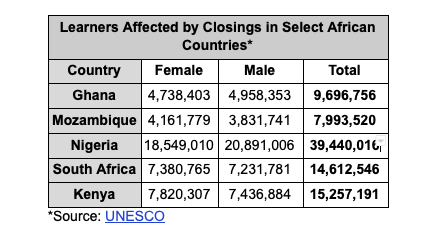This blog was written by A4AI Africa Regional Coordinator Onica Makwakwa.
As the Covid19 crisis continues to expose our extreme inequalities, children and youth are among the most vulnerable. This is especially so given the disparate impact due to the lack of access to internet connectivity in many homes which threatens educational goals and aspirations. School closures continue to widen the education gap with a disparate impact on children and youth from poor, rural and/or lower socioeconomic backgrounds as well as threaten to undo achievements made today in advancing schooling for girls.
According to the UNESCO Institute of Statistics Data, over 91% of the world’s student population is affected by the national and/or local school closures due to this pandemic. In Africa, the continent with the youngest population, this could have a devastating impact, especially when juxtaposed with existing low rates of internet access and overall lack of affordability for the majority of its citizens.

Despite efforts such as the UNESCO-led #LearningNeverStops initiative, which recently received an endorsement from the Southern Africa Development Community (SADC), the reality is that for millions of learners – especially those in public schools and/or from poor, rural communities who are digitally excluded and therefore cannot take full advantage of these “distant learning” opportunities – they run the risk of being left behind once again.
The challenge of meeting learners’ needs during the Covid19 related lockdowns must not be left up to education departments alone. Rather it must be addressed through an integrated approach at the national level as part of overall economic turnaround plans. Government and the private sector as well as civil society must unite in an effort to close the digital divides in our society and build a truly inclusive economy. The Web Foundation and the Alliance for Affordable Internet (A4AI) have published a Policy Brief on Internet Access and Affordability which recommends governments, companies, and civil society to take urgent actions to bring as many people online as possible during this global emergency.
For African countries, the success of initiatives such as the #LearningNeverStops campaign, as well as other efforts to mitigate the disruption to education and economic plans requires a commitment to the following:
- Expand access to the internet – Government and private sector must make urgent and bold investments and re-prioritise existing resources to swiftly provide access including, although not limited to, leveraging existing technologies to enable public access. In the short term, mobile operators can make hotspots available to address the urgent and surging needs. While doing so, it is important to also prioritise those in rural areas, peri-urban and poor communities.
- Ensure affordable internet prices – High internet costs have been one of the main reasons many are unable to benefit from being online. Today, these benefits are important for delivering critical education opportunities and information that could save lives. As more learners will be forced to come online, it is important that even those from families that survive on less than $2 per day can in fact afford to connect, especially during this time. A4AI’s 2019 Affordability Report shows that only 10 out 45 tracked countries in Africa actually meet the affordability standard for internet, as recommended by the United Nations Broadband Commission, at 1G of mobile prepaid data for no more than 2% average monthly income. The circumstances around the current pandemic make for a compelling case for urgent financial policy interventions to promote affordable access. Economic stimulus packages must consider subsidizing digital access to ensure affordability through various instruments, such as: (i) rolling back of taxation in the sector to ease pressure on consumers, from VAT on data to a rollback of import duties on handheld devices to ensure their affordability (perhaps with some additional tax incentives for locally assembled devices to help address longterm employment and needs to reskill the workforce for digital economies), (ii) subsidising daily data bundles per student especially targeting those from low socioeconomic backgrounds, (iii) creating a Data Bank for donation of data bundles and depository of all unused prepaid data, instead of expiring, which could then be redistributed for community public access within a specific timeframe, (iv) committing to a pro-poor pricing regime for pre-paid consumers, and (v) mobile operators should be required to introduce data bundles for working/learning from home that are also geared for the pre-paid market which is dominant in the region.
- Fast track Universal Access – The case for universal access is more prevalent now than ever before. Universal service plans and funds can play a critical role and should be re-prioritised to respond to urgent needs that can yield quick results such as subsidising handheld devices for teachers and/or learners, supporting public access, fast tracking skills development in critical areas such as teacher training for digital classrooms, etc. Smart prioritisation of existing resources is critical in helping excel and improve capacity of inclusive education.
As more learners stay home and citizens are called upon to practice social distancing in order to slow down the rate of Covid-19 infections – which is important to our safety and public health, access to affordable Internet becomes central to our survival, and economic stability.
We must ensure all learners have access to the Internet.
For more updates on our work, follow us on Twitter at @a4a_internet and sign up to our newsletter.
